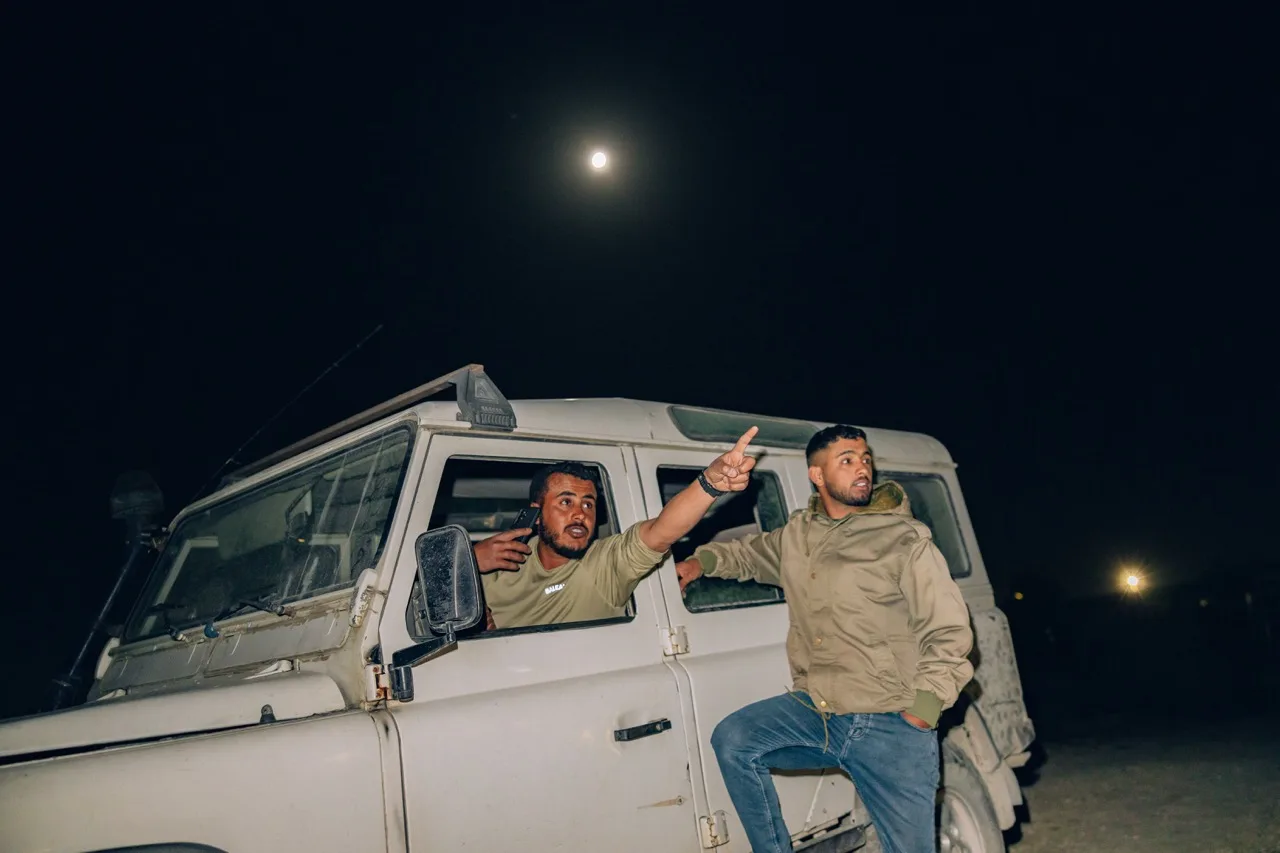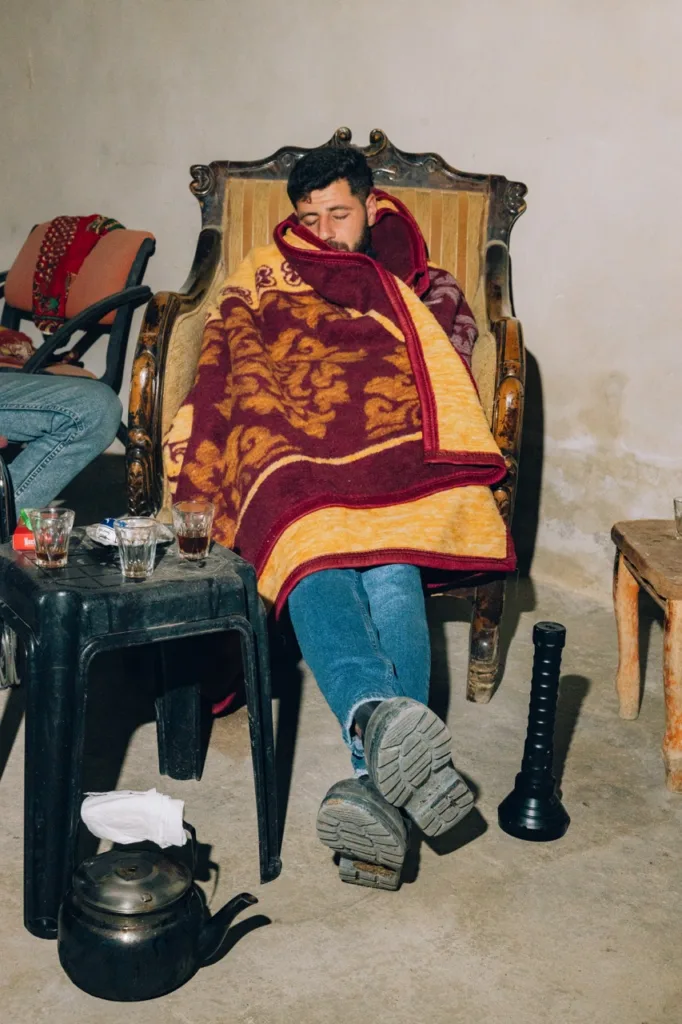 Posted in
Feature,
Posted in
Feature,
Al Natara: Meet Palestine’s DIY night watchers
Text and Photography by Maen Hammad









The night never fully sleeps in Masafer Yatta. As settler-colonial violence intensifies in this cluster of 19 Palestinian villages and hamlets in the hills of the southern occupied West Bank, local communities have organised their own nightly defence shifts called natara, a colloquial word in Palestinian Arabic that means ‘to keep watch, to stand guard’. It’s not just protection from attack, but from the slow, suffocating terror designed to cleanse Palestinians from their land.
“When you put your head on the pillow, you start to revise everything you went through during the day—your whole life, really. Everything comes back to haunt us, and it becomes almost impossible to sleep,” Tariq Hathaleen tells me on one of those sleepless nights. “The only thing that helps is knowing one of yours is outside watching, knowing someone is doing the natara. It gives you some kind of security. A sense of it, at least.”
Tonight, his name appears on the shared night watch schedule in Khirbet Umm Al-Khair. He and his cousin are responsible for the 12am to 6am shift. Armed with flashlights, cameras, and an active WhatsApp group, this is their community’s own self-defence.
Like the 18 other communities scattered across Masafer Yatta, Umm Al-Khair has built a grassroots security system against the swarming settler militias and Israeli regime that terrorise this small Bedouin community. And the residents of Masafer Yatta understand the stakes better than anyone. Since the 1980s, their communities have sat on the literal frontline of Israel’s settler-colonial project. Surrounded by expanding illegal Israeli settlements, their land is being stolen, their way of life criminalised, and they are encircled by a settler-army nexus working in lockstep to displace and cleanse more Palestinians from their homes.
In Mufaqara, just a few kilometres from Umm Al-Khair, Qassim Al Tahan sits with his children in the guesthouse, built atop the cave carved by his grandfather a century ago. When the current genocide in Gaza began, the Israeli army bulldozed the guesthouse. They rebuilt it the same night.
“They think us shepherds don’t know how to do anything,” he says. “That we would just give up. They don’t realise the biggest honour for us is to die on our land. We are already living in oppression. But to live like a dog? It’s not 1948 anymore. We refuse to be displaced again.”
For years, these communities haven’t known a normal night’s sleep. “We are in limbo, waiting like sheep for slaughter,” Al Tahan reflects, as his son pours another round of caffeinated, bright red tea. “The settlers know me by name. They ask the other shepherds where I live, provoking, ‘I want to see him at night.’”
Across occupied Palestine, it’s now common to hear Palestinians say they almost wish it were only soldiers they were facing. The settlers are worse. They can storm into your village, shoot you, burn your home, summon the army to arrest your family, and stroll back to their colony untouched.
Only weeks prior, in the nearby village of Al-Rakeez, 60-year-old Saeed Rabaa was shot in the leg when he confronted Israeli settlers who had entered his family’s land. As he lay bleeding, Israeli soldiers arrived and detained his 16-year-old son, accusing him of assaulting the settlers. Rabaa was taken to the hospital, where his leg was amputated. Both father and son were held in detention and eventually fined US$2,800. But Palestinians in Masafer Yatta refuse to bow. “If you bow your head, you will never live,” adds Al Tahan.
With the kind of soft smile only possible under the surreal weight of 21st century ethnic cleansing, Al Tahan recounts the four times his home was destroyed before revealing that, even if every house in Mufaqara was to be destroyed again, there are 28 caves under the ground. “What the settlers don’t realise is that even if they wipe us from the surface of this land, we were born in the caves. Above ground or below, we will live,” he says, as he passes the night shift duty to his two sons and goes to sleep.
Palestinians, as guardians of the land, know not only its paths, but also its sounds and silences, the ways it warns of settlers and soldiers. In what outsiders might see as arid and unlivable, they have honed an indigenous knowledge of survival—more precise, perhaps, than the billions spent on weaponry deployed against them. Masafer Yatta is their oasis, suffocated by the Israeli regime’s supremacist control. Water is scarce. Most homes are under threat of demolition. Illegal settlements and war crimes are multiplying. Night patrols are intensifying. More villages are being locked down. And yet, it is home.
“It’s getting scary,” admits Mohammad Hureini, an activist and student from nearby Al-Tuwani. “The settlers do whatever they want. I think about this a lot. About what’s going to happen next.”
Between university classes near Ramallah – a city wrapped in the illusion of post-Oslo security – Hureini returns on weekends to Masafer Yatta, where the frontlines are anything but an illusion. He joins the night watches in neighbouring villages. It takes a network of communities to defend the land—an entire network of illegal settlements surrounds them. The villagers know every detail of these settlers: their patterns, their preferred violence, the rhythms of terror they unleash.
“You see that light up there? That’s Carmel. And that’s the worst one—Havat Ma’on outpost,” say Hureini and Al Tahan’s sons, pointing from the window of the guesthouse. Since the ongoing genocide in Gaza began, over 40 new illegal outposts have popped up across the occupied West Bank, 14 in Masafer Yatta alone. The expansion of Israel’s colonial project is unfolding in real time, right in front of their homes. Right in front of our eyes.
Back in Umm Al-Khair, Hathaleen and his cousin split the night shift into rotations, using a variety of tactics. They patrol in a worn out Land Rover, circling the village every few hours and positioning themselves on the highest hilltops – those not yet stolen – to keep an eye on the community.
They’re especially worried about settler militias entering the Salem family home and its surrounding farmland. Four months ago, settlers from Carmel and neighbouring colonies seized the southern hilltop inside the family’s private land. They placed a caravan, an Israeli flag, and cameras within feet of the family home—the embryo of a new outpost was created. Some nights, the settlers come and throw parties. Other nights, they wear masks and cut down the olive trees of residents.
By day, a new terror squad – the pastoral settlers – graze the land that Umm Al-Khair residents have tended for generations. Now, even touching that land has been criminalised. It’s not fines or prisons that Palestinians fear, but the machine gun, the trigger, the settler’s excuse to kill.
At the Salem home, Shimon, a notoriously violent settler with a flair for Zionist fantasy, brings his sheep to graze in the family’s backyard, staging his own theatre of domination. He insists, with the audacity only an occupier could muster, that half the house – including the space where their living room meets their bedroom – is “state land”.
This new prototype of settlers cosplays as shepherds, using their flock of animals as tools to mobilise the apartheid state into seizing thousands more acres of Palestinian land. “The settler who started this tactic deserves his photo next to Zionism’s founder, Theodor Herzl,” says Hathaleen. “They took more land in four months than they did in decades.” In the wild west of Zionist domination, the settler dictates the hills they want, steals your livestock, calls the army, and gets you arrested. Then they fine you for a ‘crime’.
To fight absurdity, Palestinians must meet it with absurdity. Under the watch of one of the world’s most advanced militaries and violent settler-colonial regimes, Palestinians refuse to sit idly. The natara is the community’s homemade counterforce. “We move at night,” explains Hathaleen. “We show them we’re here because we know they’re watching us, too.”
As Hathaleen’s shift starts, he stares at the top of the TV screen showing the village’s camera feeds. A flashing blue light rotates above a military jeep—the army is outside the community centre. He picks up his camera and starts recording. “We can tell they have a new batch of soldiers training,” he remarks. They’ve been coming every day.”
He sends a message to the next hilltop, warning them the soldiers might head their way to search the community, now a routine practice of collective punishment. “Probably a good chance they will come back. If they come, ahlan wa sahlan. Welcome. We’re here,” he jokes, reflecting the dark humour demanded by the daily circus of supremacist rule.
Halfway through the night shift, Hathaleen points to the distant howls from two hilltops away as he and his cousin devour handfuls of sunflower seeds. “That’s the fox singing to us.” He motions to the horizon line, asking me to try to spot the two soldiers patrolling the outpost. I squint, but see nothing. “Your eyes are sharper than those of a falcon,” I say.
“It’s part of being Bedouin,” he responds. “We’re raised in these harsh conditions. We know all the tricks when it comes to watching. The secret to a good watchman? Sit still.”
Taking a pause, he adds, almost as a correction: “But we’re more than murabiteen [the Arabic word for the ones committed to guard and protect]. We are prisoners. The murabiteen stay in front of the army, but behind them are friends. Us? Behind, in front, on all sides—we are surrounded by oppressors.”
Surrounded, they keep watch.
